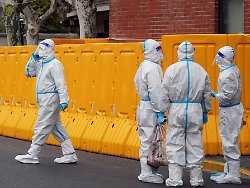Chamber of Commerce chief in China
“30 percent of China’s economy is at a standstill”
4/11/2022, 3:11 p.m
Shanghai is considered China’s most organized city. But the metropolis has been in a tough lockdown for weeks, which is not only paralyzing the economy. The consequences of this crisis will also be felt in Germany, reports the head of the European Chamber of Commerce in China, Jörg Wuttke, in an interview with ntv.
ntv: China’s financial and economic center Shanghai has been closed for days, weeks. 26 million people are no longer allowed out. There are problems with medical care and food supplies. What do you hear from Shanghai, especially from the Germans there?
Jörg Wuttke: Expats are currently gathering online and trying desperately to organize charter flights, among other things. You try to help each other: where do you get your diapers from? Where do you get vegetables from? It’s all extremely difficult to organize. The mood is at zero. Shanghai, the most urban, the best organized city in China, has lost its luster in record time.
They live in Beijing. How is the situation there?
I’m here on the island of the blissful. We have two or three cases. That’s nothing big. But of course we all live in the premonition that this will not be limited to Shanghai. You have to know that Jilin in northern China is even worse. Volkswagen and Audi, among others, have their large factories there. People there have been in lockdown for four weeks. Companies have had people in the factory for weeks who continue to produce but cannot go home. Shenyang, a city with over a million inhabitants and location of the German automotive industry, has also been in lockdown for two or three weeks. Currently about 30 percent of China’s gross national product, the Chinese economy is in some form of lockdown and 26 percent of the population. So this is not limited to Shanghai.
You address the car manufacturers. Are there expectations that the situation for the affected companies will soon ease up again?
I believe that around 30 percent of automobile production in China is currently at a standstill and we don’t know what will happen next. This is a difficult box because, of course, there are huge supply chains behind it. Getting these supply chains back in sync and bringing them back is not easy. You will definitely see that in the bad economic figures in the coming months.
How will this affect the German and global economy?
It’s not so obvious yet. This will certainly be reflected in the pharmaceutical industry, among other things. Many of the pharmaceutical precursors come from China. Anywhere between 20 and 30 percent of all goods sold anywhere in the world have a little bit of China in them. Switching things around and saying, for example, I no longer buy in China but in Japan, for example, or Korea, isn’t that easy. In addition, China’s ports are still open, but that can change. And then it gets expensive. Then each container will be twice as expensive. We experienced that from time to time last year. The situation in China will definitely strain supply chains. Ironically, China, which kept the global economy running for two years during the pandemic and helped us out of the mess, is now finding itself in this situation in the end.
Do you think this strict zero-Covid strategy can be enforced permanently?
Yes, I believe the official policy remains: the zero Covid strategy is being carried out. It also has something to do with the President, who has been going around the world for the last two years and saying everywhere: ‘Look how great we are doing and how badly you are doing it.’ I don’t know whether politicians will be able to change the narrative in terms of propaganda and also allow more corona cases. That’s a big ideological leap.
Ulrich Reitz spoke to Jörg Wuttke.
